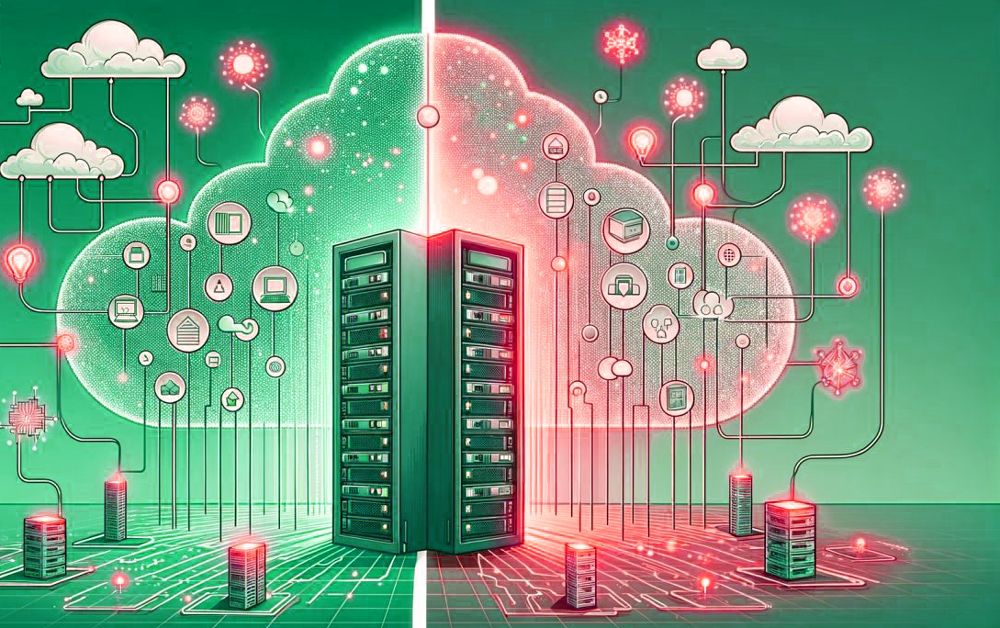In the age of technology 4.0, businesses and individuals are increasingly shifting toward cloud-based solutions rather than traditional server systems. One of the most popular options in cloud computing is the Cloud Server. But what exactly is a cloud server? What are its advantages and disadvantages, and is it the right choice for your business or project? Let’s explore these questions in depth in this article.
1. What is a Cloud Server?
A Cloud Server is a virtualized server that is hosted and managed in a cloud computing environment. Unlike traditional physical servers, cloud servers do not reside on specific hardware but instead are distributed across multiple physical servers within data centers. Through virtualization technology, users can access and manage these servers remotely via the internet.
Cloud services are provided by major vendors such as Amazon Web Services (AWS), Microsoft Azure, Google Cloud, and DigitalOcean, which allow users to create, configure, and maintain virtual servers without the need to invest in costly physical hardware or worry about maintenance.
2. Advantages of Using a Cloud Server
There are several key benefits of using virtual servers, especially for businesses that require flexibility, scalability, and remote management. Below are the major advantages of these services.
2.1. Scalability and Flexibility
One of the most significant advantages of using a cloud-based server is its ability to scale resources according to demand. You can easily increase or decrease resources such as CPU, RAM, and storage without any downtime. This flexibility makes it an ideal solution for businesses with fluctuating needs, such as e-commerce platforms, SaaS applications, or media services that experience varying levels of traffic.
With this on-demand scalability, you don’t need to invest in additional physical hardware or worry about over-provisioning. As your business grows, your infrastructure can grow with it, ensuring that you can always meet user demand.
2.2. Cost Savings
Cloud computing offers significant cost savings compared to traditional physical servers. Rather than investing in expensive hardware and paying for its maintenance, you only pay for the resources you use. This pay-as-you-go model helps reduce upfront capital costs and operating expenses.
Many cloud providers offer flexible pricing models that cater to different needs, allowing businesses to adjust their usage and costs according to their specific requirements. As a result, small and medium-sized businesses can enjoy enterprise-level infrastructure without the hefty price tag.

2.3. High Availability and Reliability
Cloud server offer excellent reliability due to the distributed nature of cloud infrastructure. Data and services are typically spread across multiple servers and data centers, which means that if one server fails, the system can automatically redirect traffic to another server without service interruption. This ensures high uptime, which is crucial for businesses that need to provide uninterrupted services, such as financial institutions, e-commerce platforms, and online services.
Leading cloud providers often guarantee near 100% uptime, offering tools for monitoring performance and alerts to quickly address any issues that might arise.
2.4. Security and Data Backup
Despite concerns over security, cloud servers typically provide strong protection measures, including data encryption, firewalls, and access controls. Major cloud providers like AWS, Microsoft Azure, and Google Cloud adhere to strict security standards, such as ISO 27001, HIPAA, and GDPR, ensuring that your data is protected and complies with international security regulations.
In addition, cloud services offer automated data backups and disaster recovery solutions, allowing businesses to easily restore their data in case of an unexpected failure or data loss.
2.5. Ease of Management and Maintenance
With cloud-based servers, you no longer need to worry about maintaining the physical hardware or managing server infrastructure. Cloud providers take care of all hardware maintenance, updates, and patches, allowing you to focus on managing your applications and services. This significantly reduces the workload on your IT team, freeing them up to focus on more strategic tasks.
Furthermore, cloud platforms often come with powerful management and monitoring tools that provide insights into your infrastructure’s performance, resource utilization, and health status, making it easier to manage and optimize your resources.
3. Disadvantages of Using Cloud Servers
While cloud-based servers offer numerous benefits, they also come with some downsides. Below are the main disadvantages that businesses should consider before making the switch.
3.1. Dependence on Internet Connectivity
One clear disadvantage of using a cloud-based server is the reliance on internet connectivity. If your internet connection is slow or unreliable, you may experience performance issues or even be unable to access your server at all. This could have significant consequences for your business operations, especially if your website or application depends on real-time data processing or customer interactions.
To mitigate this risk, ensure that your organization has a stable and high-speed internet connection. In addition, consider using backup internet connections to ensure continued access in case of a primary connection failure.

3.2. Potentially Higher Costs
Although cloud services offer a pay-as-you-go model, the cost can rise quickly if you’re not careful. Over time, as your data usage, storage, and resource needs grow, your monthly bills can become unpredictable and even exceed the cost of owning and maintaining a physical server infrastructure.
It’s essential to monitor your cloud usage closely and optimize your resources to avoid unnecessary costs. Many cloud providers offer cost management tools that help you track usage and prevent unexpected charges, but you still need to be proactive in managing your resources.
3.3. Security and Control Concerns
While cloud providers implement high levels of security, some businesses may be uncomfortable with the idea of storing sensitive data on a third-party infrastructure. Since you don’t have physical access to the servers, you may feel that you lack control over the data’s security.
If your organization handles highly sensitive data (e.g., financial records, personal information), you may have compliance requirements that require extra levels of security or data sovereignty. In such cases, it’s crucial to carefully review the security policies and data management features of the cloud provider you choose.
Additionally, moving data to and from a cloud service can introduce security risks if not managed properly. Ensuring that data is encrypted both in transit and at rest is vital for protecting your information from unauthorized access.
3.4. Performance Issues
Despite the promise of high reliability and performance, cloud servers can sometimes experience slowdowns due to factors like resource sharing with other users or issues at the data center level. Performance can also be impacted by network latency, particularly if your users are located far from the data centers where your resources are hosted.
While cloud providers do offer high-performance options and dedicated resources, these can come at a higher cost. For businesses requiring ultra-low latency or extremely high-performance computing, a traditional physical server might be more suitable in certain cases.
4. Should You Use a Cloud Server?
The answer to this question largely depends on your business needs. Cloud server are an excellent choice for those who need scalable, flexible infrastructure with minimal upfront costs. They are ideal for businesses that experience fluctuating resource demands or require high availability and reliability. If you operate an e-commerce website, a SaaS platform, or any online service, cloud computing provides the scalability and resources needed to handle increasing traffic and user demands.
On the other hand, if you need more control over your infrastructure, have specific security or compliance concerns, or if your business relies heavily on consistent, high-performance computing, you may want to consider alternative solutions.
Before deciding, evaluate your specific requirements in terms of cost, security, scalability, and performance. Many cloud providers offer free trials or introductory credits, so you can test the service before committing long-term.
5. Conclusion
Cloud server are a powerful solution for businesses looking to scale quickly, reduce costs, and increase the flexibility of their IT infrastructure. The ability to pay for only what you use, combined with the ease of management and high availability, makes it a compelling choice for many modern enterprises. However, it’s essential to weigh the potential downsides, such as reliance on internet connectivity, security concerns, and unpredictable costs.
Ultimately, whether or not to use a cloud-based server comes down to your specific business needs. If you require a scalable, cost-efficient solution and are comfortable with the level of control and security provided by cloud vendors, then a cloud-based approach can be highly beneficial. Just make sure to carefully assess your usage patterns, security requirements, and long-term costs before fully committing.
* Contact us:
- Email: dc@dcx.com.vn
- Phone: 0333361599
- Facebook: https://www.facebook.com/DCX.Tech.Solutions/
